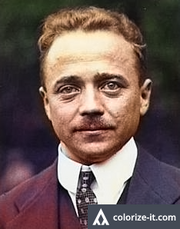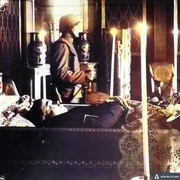
Engelbert Dollfuss (4 October 1892 – 25 July 1934) was the Chancellor of Austria (succeeding Karl Buresch and preceding Kurt Schuschnigg) and Foreign Minister of Austria from 1932 to 1934 (succeeding Karl Buresch and preceding Stephan Tauschitz). He was an early opponent of the Nazi Party and was assassinated by Nazis in Austria in 1934, a year after they took power in Germany.
Biography[]
Engelbert Dollfuss was born on 4 October 1892 in Texingtal, Austria-Hungary (present-day Austria). He was a devout Roman Catholic who studied at a seminary before studying law at the University of Vienna and economics at the University of Berlin. Dollfuss was slightly over five feet, so he barely made it into the Austro-Hungarian Army during World War I. He was captured by the Kingdom of Italy in 1918 and held as a prisoner-of-war, and after the war he worked with agriculture in postwar Austria. In 1932, he was offered the title of Chancellor by President Wilhelm Miklas, and on 20 May 1932 he was sworn in at the head of a coalition government. His economy failed to improve due to most of Austria's pre-Treaty of Versailles economy lying in Yugoslavia and Hungary. In 1933, with the creation of Nazi Germany by Adolf Hitler's Austrian Nazi Party, Dollfuss felt threatened by the rise of Nazism in Europe and declared it illegal to be a member of the party.
Dictator of Austria []

Dollfuss in his casket
Becoming a Fascist dictator, Dollfuss exercised all power in the government and for a few weeks in February 1934 there was an Austrian Civil War. Police and military power put down the industrial workers and social democrats, and in April 1934 he introduced a new constitution with corporatist ideas. All of democracy in Austria was crushed, and Dollfuss became the ultimate leader of Austria.
Dollfuss was assassinated by ten Austrian Nazis in July 1934 in response to his dictatorship. Benito Mussolini, the leader of Austria's ally of Fascist Italy, threatened to invade Nazi Germany if Hitler wanted to support the Nazi forces. Italian troops and Austrian police helped to put down Nazi uprisings in other parts of the country, and Hitler was delayed for four years in his annexation of Austria.
